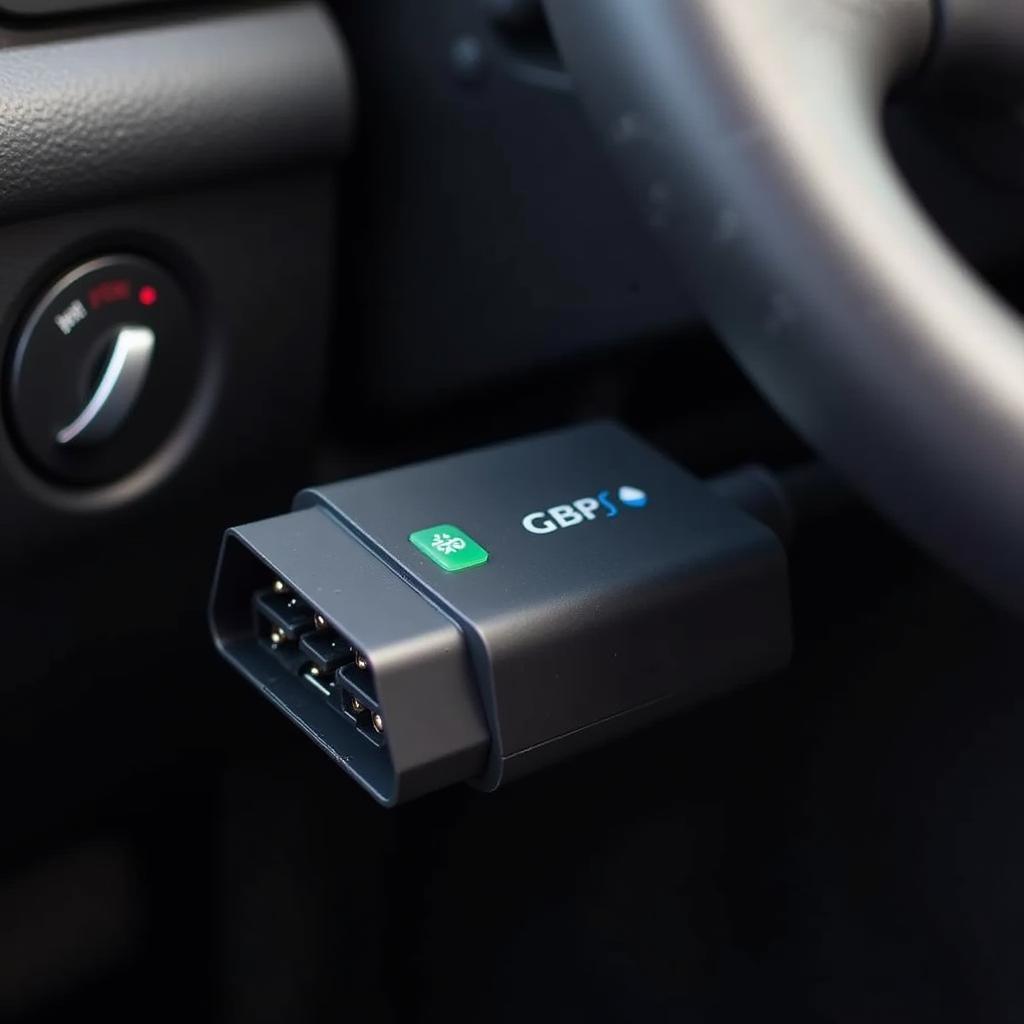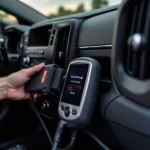GPS OBD2 standards are rapidly changing how we track and diagnose vehicles. By combining the power of GPS tracking with the diagnostic capabilities of OBD2 scanners, this technology offers a powerful solution for fleet management, vehicle security, and even personal use. This article will delve into the world of GPS OBD2 standards, exploring their benefits, applications, and the factors to consider when choosing the right device for your needs.
What are GPS OBD2 Standards?
GPS OBD2 standards refer to the technical specifications that allow GPS tracking devices to seamlessly integrate with a vehicle’s OBD2 port. The OBD2 port, typically located under the dashboard, acts as a vehicle’s data hub, providing access to real-time information about the engine, transmission, emissions, and more.
By tapping into the OBD2 port, GPS trackers can access a wealth of data beyond just location. This allows for a comprehensive view of vehicle health, driver behavior, and other vital parameters.
How GPS OBD2 Standards Work
GPS OBD2 devices typically function by drawing power from the OBD2 port and leveraging the vehicle’s battery. They utilize a combination of GPS and cellular technology to transmit data. The GPS module pinpoints the vehicle’s location, while the cellular module relays this data to a server, where it can be accessed by users through a web-based platform or mobile app.
The real-time data transmission facilitated by these standards enables a range of features, including:
- Real-time Location Tracking: Monitor the exact location of your vehicle at any time.
- Trip History and Reporting: Access detailed logs of past trips, including routes taken, distances covered, and duration.
- Vehicle Diagnostics: Receive diagnostic trouble codes (DTCs) and engine performance data.
- Driver Behavior Monitoring: Track metrics such as speed, acceleration, braking, and idling to promote safe driving habits.
- Geofencing and Alerts: Set up virtual boundaries and receive notifications if a vehicle enters or exits designated areas.
- Anti-theft Features: Some devices offer remote immobilization capabilities in case of theft.
Benefits of Using GPS OBD2 Standards
The adoption of GPS OBD2 standards brings forth a multitude of advantages for both individuals and businesses:
For Vehicle Owners:
- Enhanced Vehicle Security: GPS tracking provides an extra layer of protection against theft and unauthorized use.
- Peace of Mind for Parents: Track teenage drivers and ensure their safety.
- Improved Vehicle Maintenance: Receive timely reminders for scheduled maintenance based on mileage or engine hours.
For Businesses:
- Streamlined Fleet Management: Optimize routes, monitor fuel consumption, and improve overall fleet efficiency.
- Enhanced Driver Accountability: Promote safe driving practices and reduce liabilities.
- Improved Customer Service: Provide accurate ETAs and real-time updates for delivery services.
Choosing the Right GPS OBD2 Device
With a plethora of GPS OBD2 devices available, selecting the right one can be daunting. Here are some key factors to consider:
- Features: Determine the specific features you require, such as real-time tracking, geofencing, or driver behavior monitoring.
- Compatibility: Ensure the device is compatible with your vehicle’s make, model, and year.
- Data Plan: Compare data plans and choose one that aligns with your usage needs.
- Ease of Use: Opt for a device with a user-friendly interface and intuitive software.
- Reputation and Reviews: Research the manufacturer’s reputation and read customer reviews before making a decision.
Integrating GPS OBD2 Standards with Other Technologies
The potential of GPS OBD2 standards extends beyond standalone tracking devices. These standards are increasingly being integrated with other automotive technologies, including:
- Telematics Systems: GPS OBD2 data can be fed into telematics platforms to provide a comprehensive view of vehicle and driver performance.
- Insurance Telematics: Insurance providers are leveraging GPS OBD2 data to offer personalized insurance premiums based on driving behavior.
- Connected Car Platforms: GPS OBD2 data can be integrated with connected car ecosystems to provide enhanced navigation, entertainment, and safety features.
The Future of GPS OBD2 Standards
As technology advances, GPS OBD2 standards are expected to evolve further, enabling even more sophisticated applications. Some potential advancements include:
- Increased Data Accuracy: The integration of advanced sensors and data analysis techniques can further improve the accuracy of GPS and OBD2 data.
- Predictive Maintenance: By analyzing historical and real-time data, GPS OBD2 devices could potentially predict potential vehicle issues before they occur.
- Enhanced Integration with Smart Cities: GPS OBD2 data can contribute to smart city initiatives by providing valuable insights into traffic patterns, parking availability, and more.
Conclusion
GPS OBD2 standards are revolutionizing the way we interact with our vehicles. By bridging the gap between location tracking and vehicle diagnostics, this technology offers a powerful toolkit for enhancing safety, security, and efficiency. As the automotive landscape continues to evolve, GPS OBD2 standards will undoubtedly play an increasingly vital role in shaping the future of transportation.
Frequently Asked Questions
1. Are GPS OBD2 devices easy to install?
Yes, most GPS OBD2 devices are plug-and-play, simply requiring you to plug them into your vehicle’s OBD2 port.
2. Can I use a GPS OBD2 device on any vehicle?
While most modern vehicles (post-1996) are equipped with OBD2 ports, it’s crucial to check the device’s compatibility with your specific make and model.
3. Is it legal to use a GPS OBD2 device?
The legality of GPS tracking devices varies depending on your location and the intended use. It’s essential to familiarize yourself with local laws and regulations.
4. What happens to the GPS data if I disconnect the device?
Most devices store data locally and will continue to transmit it once reconnected. Some devices also offer cloud storage options for data backup.
5. Do GPS OBD2 devices drain the vehicle’s battery?
While these devices draw a small amount of power from the battery, they are designed for minimal power consumption and should not significantly drain a healthy battery.
6. Can a GPS OBD2 device improve my fuel economy?
By monitoring driving behavior and providing insights into fuel consumption patterns, some GPS OBD2 devices can help drivers adopt more fuel-efficient habits.
7. Can I use a GPS OBD2 device for personal and business use?
Yes, many devices offer flexible settings and user profiles to accommodate both personal and business use cases.
For any further assistance or inquiries regarding GPS OBD2 standards, OBD2 scanners, or related topics, feel free to reach out to us. Our team at OBDFree is available 24/7 to assist you. You can contact us via WhatsApp at +1(641)206-8880 or email us at [email protected].


